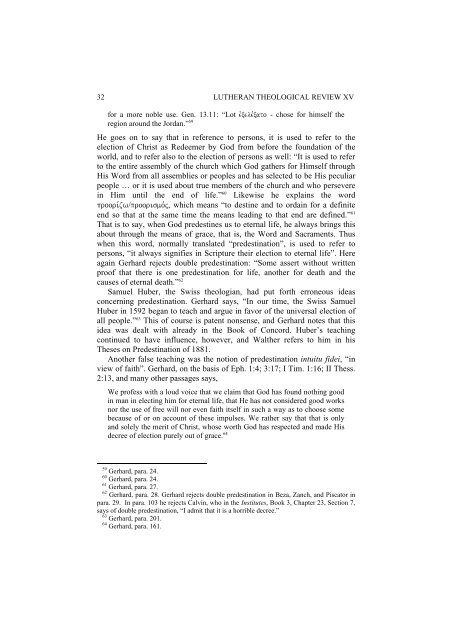LUTHERAN THEOLOGICAL REVIEW - Brock University
LUTHERAN THEOLOGICAL REVIEW - Brock University
LUTHERAN THEOLOGICAL REVIEW - Brock University
You also want an ePaper? Increase the reach of your titles
YUMPU automatically turns print PDFs into web optimized ePapers that Google loves.
32 <strong>LUTHERAN</strong> <strong>THEOLOGICAL</strong> <strong>REVIEW</strong> XV<br />
for a more noble use. Gen. 13.11: “Lot evxele,xato - chose for himself the<br />
region around the Jordan.” 59<br />
He goes on to say that in reference to persons, it is used to refer to the<br />
election of Christ as Redeemer by God from before the foundation of the<br />
world, and to refer also to the election of persons as well: “It is used to refer<br />
to the entire assembly of the church which God gathers for Himself through<br />
His Word from all assemblies or peoples and has selected to be His peculiar<br />
people … or it is used about true members of the church and who persevere<br />
in Him until the end of life.” 60 Likewise he explains the word<br />
proori,zw/proorismo,j, which means “to destine and to ordain for a definite<br />
end so that at the same time the means leading to that end are defined.” 61<br />
That is to say, when God predestines us to eternal life, he always brings this<br />
about through the means of grace, that is, the Word and Sacraments. Thus<br />
when this word, normally translated “predestination”, is used to refer to<br />
persons, “it always signifies in Scripture their election to eternal life”. Here<br />
again Gerhard rejects double predestination: “Some assert without written<br />
proof that there is one predestination for life, another for death and the<br />
causes of eternal death.” 62<br />
Samuel Huber, the Swiss theologian, had put forth erroneous ideas<br />
concerning predestination. Gerhard says, “In our time, the Swiss Samuel<br />
Huber in 1592 began to teach and argue in favor of the universal election of<br />
all people.” 63 This of course is patent nonsense, and Gerhard notes that this<br />
idea was dealt with already in the Book of Concord. Huber’s teaching<br />
continued to have influence, however, and Walther refers to him in his<br />
Theses on Predestination of 1881.<br />
Another false teaching was the notion of predestination intuitu fidei, “in<br />
view of faith”. Gerhard, on the basis of Eph. 1:4; 3:17; I Tim. 1:16; II Thess.<br />
2:13, and many other passages says,<br />
We profess with a loud voice that we claim that God has found nothing good<br />
in man in electing him for eternal life, that He has not considered good works<br />
nor the use of free will nor even faith itself in such a way as to choose some<br />
because of or on account of these impulses. We rather say that that is only<br />
and solely the merit of Christ, whose worth God has respected and made His<br />
decree of election purely out of grace. 64<br />
59 Gerhard, para. 24.<br />
60 Gerhard, para. 24.<br />
61 Gerhard, para. 27.<br />
62 Gerhard, para. 28. Gerhard rejects double predestination in Beza, Zanch, and Piscator in<br />
para. 29. In para. 103 he rejects Calvin, who in the Institutes, Book 3, Chapter 23, Section 7,<br />
says of double predestination, “I admit that it is a horrible decree.”<br />
63 Gerhard, para. 201.<br />
64 Gerhard, para. 161.













